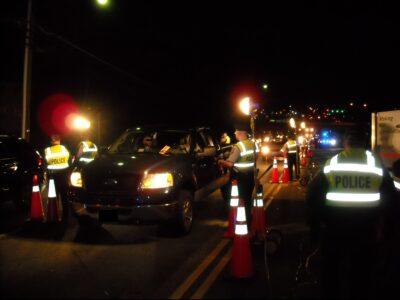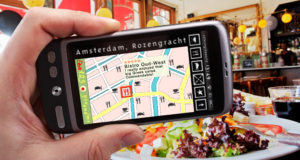
image courtesy of fairfaxcounty.gov
It’s been almost a year and a half since I wrote the article A Brief History of Checkpoints (and What to do About Them). That’s not a really long time in the grand scheme of things, but some progress regarding roadblocks has developed in that short period of time.
The April 2012 checkpoint article demonstrated that the past few years have not been kind to roadblock proponents. Roadblock lobbyists proposing DWI checkpoint legislation have been handily defeated in the states that prohibit such roadblocks. Not only have they been defeated, but several states permitting roadblocks have introduced legislation that would repeal roadblock laws. These proposals were not realized, but the Utah house did actually vote to eliminate roadblocks. The Utah law was not repealed; however, the positive house vote represents much more progress than the roadblock lobbyist legislation that, in effect, never got beyond a first reading anywhere.
More progress is represented by the plethora of evidence showing that roadblocks are neither effective at apprehension, nor are they effective in deterring the behavior they attempt to curb — namely drunk driving. The scientific evidence is being confirmed by law enforcement officers, many of whom are on record criticizing the failed technique. The criticism has even resulted in policy changes by departments when they announce they are abandoning the method.
Perhaps the most interesting progress is represented by developments in technology, particularly telecommunications. Media technology of yesteryear was mostly linear, a one way direction that left little room for discussion or interaction. “Alternative” media was largely underground, limited to esoteric journals and other publications at universities, or perhaps the funky newspaper of a hip Manhattan, N.Y., neighborhood. Citizen points of view in newspaper editorial sections were largely screened by editors who leaned toward more mundane — if not safe — points of view. If the so-called mainstream media dared venture into any such unorthodox territory, then it was generally in the form of eccentric points of view on innocuous topics. Remember when Andy Rooney was a hit?
Citizen participation has largely been enabled by telecommunications. An immediate example is this website that you are viewing — and indeed — this very article. You are able to comment and I can reply. Others can comment. I can also reply to them. We can reply to one another and have multiple discussions. We are able to participate in discussions that, not so long ago, were limited to a roomful of people.
YouTube, the video sharing website, also has made a difference. YouTube is only a decade old, but its impact has often quenched our desire for something different. A pertinent example is related to roadblocks. The past several years have seen a marked increase in the number of YouTube videos of citizens either filming roadblocks, or, better yet, showing people resisting them.
A man named Terry Bressi is probably the first motorist to film himself resisting multiple checkpoints and posting them on his website. Mr. Bressi is the man who challenged a roadblock over 10 years ago, an act that resulted in a court settlement and a cash award for Bressi. Terry noticed that there was a trickle of others imitating his behavior and making YouTube postings. He was so delighted by this that he recently sponsored a contest to see who could offer the most roadblock resistance while passing through one. His proposal was met with enthusiasm and multiple entrants showed themselves imitating Bressi’s actions.
Video-sharing technology has also served the roadblock resistance cause by showing people warning others of checkpoints in their area. An Albemarle, Va., man harassed by a roadblock in his own neighborhood took exception to the police when he warned other motorists of the checkpoint with his hand-held sign. Activists in New Hampshire have also been recently warning motorists, with one such group projecting the warning with a laser on the overpass. They have performed this act no less than a half dozen times. A recent citation against their laser equipment and actions was dropped by the prosecutor just this month.
All of these actions could be dismissed by concluding that such efforts are still the domain of a narcissistic technology that goes largely unnoticed in wider circles; however, a group that has taken notice is the mass media. So-called mainstream news sources have begun to cover the issue, including major newspapers, and most recently, San Diego TV station KPBS’ 2013 interview with the ACLU regarding the constitutionality of roadblocks.
The “mainstream” media’s increasing coverage of the issue could be fueled by the competition of the alternative information sources, namely those on the internet, such as YouTube. The one-way linear coverage mentioned earlier was once simply the 6 o’clock local news police blotter, or popular and highly edited programs such as TV’s COPS. The almost public relations-type coverage of law enforcement in these arenas contrasts sharply with the more provocative visuals of YouTube sharing, so perhaps mainstream media has been compelled to catch up.
Another relevant technology regarding checkpoints is the portable electronic device. Texting has certainly become a popular way to alert others of roadblocks. Apps are also on the market. I was not able to find a DWI checkpoint app from Apple since it dropped them two years ago; however, Google’s app is readily available. Gone also is the recent attempt by Congress to ban such apps altogether.
Technology not only teaches us lessons about — well, technology – but it also teaches us lessons about ourselves. It is still arguable whether or not telecommunications like the Internet is having the same impact as Gutenberg’s printing press. It’s certainly possible, especially considering how governments have reacted to the very powerful and very coalescing technology. It was Secretary of State John Kerry who just told us this month that the internet “makes it harder to govern.” If one listens to the speech, the context of power and control was unmistakable.
It remains to be seen how technology will affect issues like roadblocks, but there can be no mistake that the genie is out of the bottle. Information distribution is often the first step in change. This information distribution has coalesced quite well with the resistance of motorists at roadblocks. We can only hope that our new generation of legislators raised on this technology will see the truth about roadblocks in all its forms.
* Checkpoint is the often-used term for the law enforcement technique; however, I interchangeably use the terms checkpoint and roadblock. Another opponent of checkpoints once pointed out to me that the term roadblock much more accurately captures the technique’s blatant violation of basic freedoms and the right to be left alone.
 Off The Grid News Better Ideas For Off The Grid Living
Off The Grid News Better Ideas For Off The Grid Living




